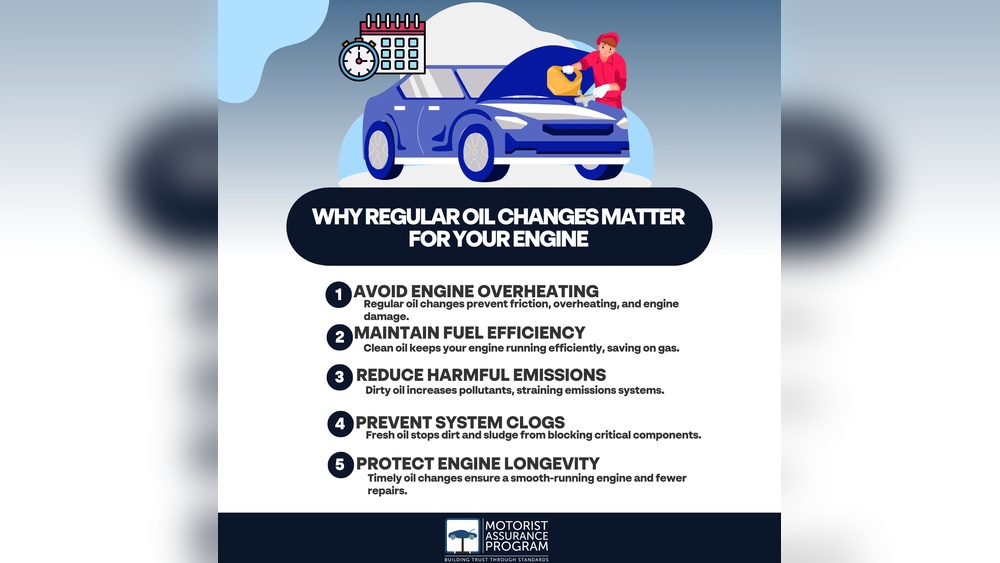Have you ever wondered if fresh oil can actually make your car run better? You might think it’s just about preventing damage, but there’s more to it than that.
The right oil can improve how smoothly your engine works, boost fuel efficiency, and even extend your car’s life. If you want to keep your ride in top shape and avoid costly repairs, understanding the role of fresh oil is key.
Keep reading to discover why fresh oil matters and how it can make a real difference for your car’s performance.

Credit: www.fowlertoyota.com
Importance Of Engine Oil
Engine oil is vital for any car’s health. It keeps the engine parts moving smoothly. Without good oil, the engine can wear out fast. Fresh oil helps the engine work better and last longer.
Role In Engine Performance
Engine oil reduces friction between moving parts. Less friction means less wear and tear. Oil also helps cool the engine by carrying heat away. It cleans dirt and debris from inside the engine. This keeps the engine running smoothly and efficiently. Fresh oil ensures these tasks happen well.
Types Of Engine Oil
There are different types of engine oil. Conventional oil is basic and suits older engines. Synthetic oil is made for better protection and performance. It lasts longer and works well in extreme temperatures. Semi-synthetic oil blends both types for balanced benefits. Choosing the right oil helps keep the engine healthy.
Effects Of Fresh Oil On Car
Fresh oil plays a key role in keeping a car’s engine healthy. It helps the engine parts move smoothly and stops damage. Using new oil regularly makes the car work better and last longer. The effects of fresh oil on a car are clear and important for daily driving.
Improved Lubrication
Fresh oil creates a smooth layer between engine parts. This layer stops metal from rubbing directly together. Less friction means the engine runs quietly and with less heat. Good lubrication also stops parts from wearing out too fast.
Enhanced Fuel Efficiency
New oil helps the engine work more easily. When parts move smoothly, the engine uses less fuel. This means the car can travel farther on the same amount of gas. Cleaner oil also stops the engine from working harder than needed.
Reduced Engine Wear
Old oil collects dirt and loses its power to protect. Fresh oil cleans and shields the engine parts. It stops small particles from scratching the engine. This protection keeps the engine strong and lowers repair costs.
Signs Of Old Or Degraded Oil
Old or degraded oil can harm your car’s engine. It loses its ability to protect and clean vital parts. Knowing the signs helps you keep your car running smoothly. Watch for changes in oil color, texture, and engine behavior. These clues show when it’s time for fresh oil.
Oil Color And Consistency
Fresh oil is usually clear or amber in color. Over time, it darkens due to dirt and engine residue. Thick or gritty oil means it has broken down. This oil cannot flow well or lubricate parts properly. Check the oil with a dipstick or by touching it. If it looks black and feels sticky, it needs changing.
Engine Noise And Performance Issues
Old oil causes your engine to run louder. You may hear knocking or ticking sounds. The engine might feel rough or less smooth. Poor oil lubrication increases friction between parts. This friction lowers engine power and fuel efficiency. Strange noises and poor performance often signal bad oil.
Oil Change Intervals
Oil change intervals are important for keeping your car’s engine healthy. Fresh oil helps the engine run smoothly and lasts longer. Knowing when to change the oil can save money and avoid engine problems. The right time to change oil depends on several factors.
Following the correct oil change schedule keeps the engine clean. It removes dirt and tiny metal particles that build up. Clean oil reduces friction between engine parts. This helps the car run better and last longer.
Manufacturer Recommendations
Car makers give specific advice on oil change intervals. These instructions are in the owner’s manual. They are based on the engine type and oil used. Most cars need oil changes every 5,000 to 7,500 miles. Some newer models use synthetic oil and can go longer. Following these guidelines keeps the warranty valid and the engine safe.
Driving Conditions Impact
Driving style and environment affect oil change frequency. Stop-and-go traffic or short trips cause oil to wear faster. Dusty roads or extreme weather also impact oil quality. Heavy towing or high-speed driving demands more frequent changes. Adjusting oil changes to your driving helps maintain engine performance. Check oil level and color often to spot problems early.
Choosing The Right Oil
Choosing the right oil is important for your car’s engine health. Oil keeps the engine parts moving smoothly. It also protects against wear and heat. Using the correct oil helps your car run better and last longer. Let’s explore key points to pick the best oil for your vehicle.
Viscosity Grades
Viscosity means how thick or thin the oil is. Oil with the right viscosity flows well at different temperatures. The numbers on oil bottles, like 5W-30, show viscosity grades. The first number with “W” shows how oil flows in cold weather. The second number shows how it flows at engine temperature. Using the correct viscosity helps the engine start easily. It also protects engine parts from damage.
Synthetic Vs Conventional Oil
Synthetic oil is made in labs with special chemicals. It lasts longer and works better in extreme temperatures. It keeps the engine cleaner by reducing sludge. Conventional oil comes from crude oil and is less refined. It usually costs less but needs changing more often. Choose synthetic oil for better engine protection and longer oil change intervals. Conventional oil works well for older cars with simple engines.
Common Myths About Fresh Oil
Many people believe fresh oil can instantly improve car performance. Some think new oil can make the engine run faster or smoother right away. These ideas are common but not always true. Understanding the facts helps you care for your car better.
Fresh oil is important for engine health. It protects parts and reduces wear. Yet, it does not give a sudden power boost or fix engine problems instantly.
Immediate Performance Boost
New oil does not make your car faster immediately. Engine speed and power depend on many parts working well. Oil helps by reducing friction, but this effect is slow and steady. You won’t feel a big change right after an oil change. The car runs better over time, not instantly.
Oil Additives And Enhancers
Some oils have additives meant to protect the engine. These include detergents and anti-wear chemicals. They keep the engine clean and safe. They do not increase horsepower or speed. Additives work quietly to keep the engine healthy. Do not expect a sudden performance boost from them.
Maintaining Engine Health
Maintaining engine health is key to a car’s performance and longevity. Fresh oil plays a big role in keeping the engine parts clean and working smoothly. Oil removes dirt and reduces friction inside the engine. This helps prevent wear and tear over time. Regular care keeps the engine running better and saves money on repairs.
Regular Oil Checks
Check your oil level often. Use the dipstick under the hood to see the oil amount. Oil should be between the minimum and maximum marks. Dark or thick oil means it is time for a change. Clean oil keeps engine parts moving freely. Low or dirty oil can cause engine damage quickly.
Complementary Maintenance Tips
Change the oil filter with every oil change. The filter catches dirt and debris. Keep the air filter clean for better engine breathing. Check coolant levels to avoid overheating. Regularly inspect belts and hoses for cracks. These simple steps help the oil work well and protect your engine.

Credit: www.ebay.com

Credit: www.ebay.com
Frequently Asked Questions
Does Fresh Oil Improve Engine Performance Immediately?
Yes, fresh oil reduces friction and helps the engine run smoothly. It improves fuel efficiency and protects engine parts from wear.
How Often Should I Change My Car’s Oil?
Most cars need an oil change every 5,000 to 7,500 miles. Always check your owner’s manual for specific intervals.
Can Old Oil Damage My Car’s Engine?
Old oil loses its lubricating properties and can cause engine wear. It may lead to overheating and decreased engine performance.
What Signs Indicate My Car Needs Fresh Oil?
Look for engine noise, reduced fuel efficiency, or a dirty oil color. Regular checks help maintain optimal engine health.
Conclusion
Fresh oil helps your car’s engine work smoothly and last longer. It keeps parts moving without too much friction or heat. Changing oil regularly prevents dirt buildup inside the engine. Clean oil also helps improve fuel efficiency and reduces engine wear.
Old oil can make your car run rough or use more fuel. Keeping fresh oil in your car is a simple way to protect its performance. Small care steps lead to big savings and fewer repairs. Your car will thank you with better runs and fewer problems.
Recent Posts
Tired of wrestling with your chains in the freezing cold? Discover how auto-fixing snow chains tighten themselves, giving you the ultimate effortless grip for a safer winter drive.
Struggling with that stubborn, hazy film on your car's glass? Discover the best oil film removers that will give you flawless, crystal-clear vision for a safer drive.

